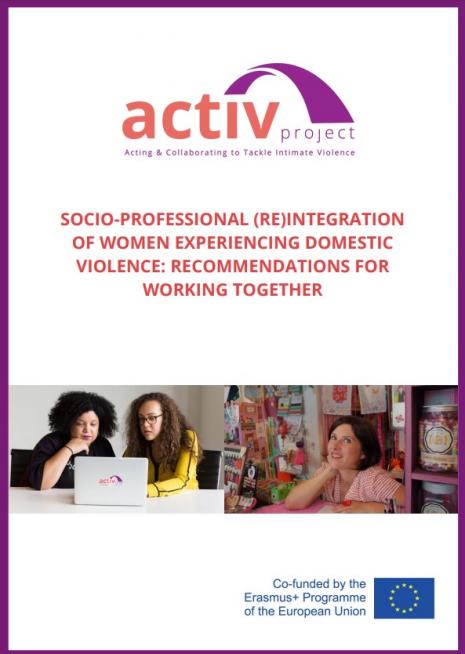
Socio-professional (re)integration of women victims of domestic violence: the ACTIV consortium publishes its white paper
Today, the Activ consortium - POUR LA SOLIDARITE (Belgium), the Mission locale pour l'emploi de Bruxelles Ville (Belgium), the Fondation Agir Contre l'Exclusion (FACE), Touched Romania (Romania) and CEPS Projectes Socials (Spain) - unveils its White Paper dedicated to improving the process of socio-professional reintegration of women experiencing domestic violence, experienced by more than one in five European women.
Initiated in 2020, the ACTIV project "Acting and collaborating to tackle intimate partner violence" aims to develop comprehensive support for women experiencing domestic violence to reduce their vulnerability and thus strengthen their resilience.
To do so, ACTIV brought together different actors likely to intervene during a women's journey to reemployment, including job search structures, specialized associations, and the women concerned. From the outset, these stakeholders were involved in the design of the program, and they participated in the construction of tools dedicated to improving the support, guidance and integration offered to the women concerned.
The publication of the white paper "Socio-professional (re)integration of women victims of domestic violence: recommendations for working together" marks the completion of this project.
The white paper: concrete recommendations for the actors involved in the socio-professional reintegration process
After conducting research with different actors in France, Belgium, Romania and Spain, the ACTIV consortium developed a series of recommendations to improve the socio-professional reintegration of victims of domestic violence. These recommendations also aim to improve synergies and cooperation between the stakeholders involved.
Among the main themes that addressed are:
-
Peripheral barriers
-
Improvement of self-esteem
-
Professional barriers
-
Difficulties encountered by field workers
-
Working with businesses
-
Improving cooperation among all stakeholders
The white paper concludes by emphasizing that all stakeholders must use a holistic approach when planning reintegration programs. We cannot expect women to succeed in the labor market without first addressing their basic needs. Indeed, employment can be a vehicle for empowerment and a way for women to leave an abusive relationship. However, victims of domestic violence must be supported in this process. The State, companies, and field workers all have a role to play.
ACTIV project: a European collaboration to support the future of women victims of domestic violence
In the framework of this two-year partnership, the members of the ACTIV project have produced three complementary deliverables that aim to improve synergies between the structures involved:
Attachment:
Read more:
Découvrir le livre blanc

